Amin shows early political cunning

The body of Kabaka Mutesa being carried back to Uganda after orders by President Idi Amin. The first Ugandan leader was later accorded a state burial. Courtesy Photo
What you need to know:
Amin’s early strategic moves
“On his return from Cairo, Amin started identifying himself with the Uganda Muslim community, which now represented Buganda’s opposition to the regime, thereby bringing about coalition between his group within the army and the civilian groups, especially in Buganda, opposed to Obote. Mistakenly or not, in the open rift between Obote and Amin, the ordinary people, especially Buganda, where the final act of the drama was being played, now saw Amin as the ‘lone soldier’ who represented the official opposition and therefore the would-be saviour of the country from impending catastrophe.”
When Idi Amin took over the presidency from Milton Obote, he embarked on power calculations that would portray him as a national peace advocate and a leader keen on picking Uganda up and taking her forward.
Having witnessed Obote fall out with Buganda, notably after the 1966 attack on the kingdom by government soldiers (commanded by Amin), the new president swiftly moved to soothe the Baganda.
Historian Phares Mutibwa explains that just three days after the coup, Amin released 55 prisoners, most of them Baganda. Some of the detainees had spent about five years in jail and their release would only strengthen the ovation Amin was enjoying locally and without.
Amin, would, however, score the biggest goal when he had Edward Mutesa’s body brought back from exile for a state funeral. The Kabaka had died in exile where he had fled the 1966 attack on his Buganda Kingdom. The return of Mutesa’s body, announced just a day after the 1971 coup, would serve to not only cultivate confidence in the new government, but raise hope among Ugandans, that a ‘saviour’ had come to rescue the country from its past woes.
The Uganda Argus in its April 1, 1971 edition, captured the gratitude of a group of Buganda mourners to Amin thus: “We are grateful for what you have done for us…We have nothing to give you except to give you our love and loyalty. We pledge to continue to be always obedient to you government. The government has returned our beloved Kabaka who died destitute for the greed of one man, the man who never suffered for the independence we are enjoying today.”
Other than the Baganda, other Ugandans were also moved by Amin’s gesture which they considered, according to Mutibwa, was crucial in healing Buganda’s wounds. However, beneath Amin’s ‘good’ gesture was an intention to reap political capital and to enter the good books of Buganda, who were still hurting from the exile, death and burial abroad of their king.
“…the decision to return the Kabaka’s body for burial in the land of his fathers was a political one, intended mainly to win popular favour. Certainly to Amin, at least in the early days of the regime, the Kabaka’s funeral was of great importance and soon his personal prestige depended not only on its taking place but also on its being done well,” explains historian Mutibwa in his book Uganda Since Independence; A Story of Unfulfilled Hopes.
He adds: “As one who knew Amin well observed, ‘it was a remarkably shrewd move, which enhanced people’s adulation of him still further. To many of them, it seemed that a saviour had arrived.’”
Outside Uganda, Amin was the best thing to have happened to the British whose economic interests had been shattered by Obote’s nationalisation agenda.
As he caroused in positive commentaries from British Media, and congratulatory messages from British government officials, Amin would then move to ‘correct’ Obote’s economic mistakes.
Britain had consciously supported the rise of Idi Amin precisely because of its long-standing interests to get rid of governments like that of Obote, who were challenging ‘elites’ and promoting ‘popular measures’.
This episode is a microcosm of general British foreign policy, showing which side Britain is generally on. Since it is an ugly picture, it is invariably safely buried away from public view.
Amin effectively reversed Obote’s nationalisation plans. “Many firms were saved from a nasty dose of nationalisation by Gen. Amin’s seizure of power,” Eric le Tocq later wrote.
In May 1971, the new regime gave a statement on its economic policy that welcomed private investment. In expectation of this statement, the Foreign Office wrote that the policy was ‘broadly welcome to British companies here and should go a long way towards the restoration of foreign investment confidence in Uganda’.
The new regime was showing ‘an encouraging attitude in the economic and financial spheres’, it noted.
“We expect its policies to be more pragmatic and less ruled by the somewhat rigid doctrines of the Obote regime” writes Tocq. All these economic and political seduction by president Amin, would work for the first few months in office.
But behind the curtains were quiet discomforts and killings as Amin launched, what historian Mutibwa describes as ‘a vicious revenge’ being ‘wreaked on some sections of the military’. “These killings were totally hidden from the civilian population, and known only to a few people outside the country with access to information supplied from the affected barracks or areas. Most were confined to the army, where tribal conflicts existed and plots were hatched to overthrow the regime,” notes Prof. Mutibwa.
However, in the meantime, Ugandans enjoyed the arrival in the political arena, of a redeemer who had come with messages of peace and reconciliation ‘in a country that had been torn by factions of hatred.’
Continues tomorrow.




